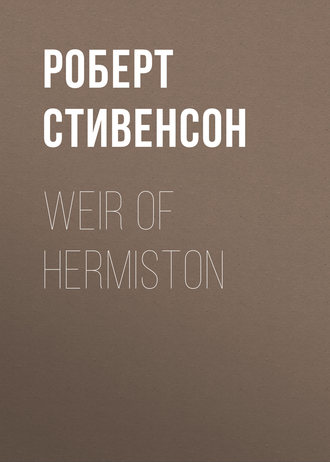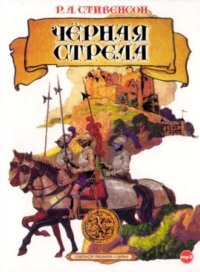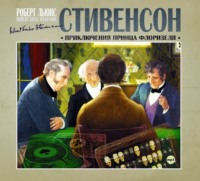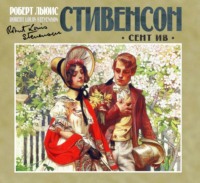 полная версия
полная версияWeir of Hermiston
A breath of embarrassment, of something like alarm, passed round the room, so daring did these words appear upon the lips of Hermiston’s only son. But the amendment was not seconded; the previous question was promptly moved and unanimously voted, and the momentary scandal smuggled by. Innes triumphed in the fulfilment of his prophecy. He and Archie were now become the heroes of the night; but whereas every one crowded about Innes, when the meeting broke up, but one of all his companions came to speak to Archie.
“Weir, man! That was an extraordinary raid of yours!” observed this courageous member, taking him confidentially by the arm as they went out.
“I don’t think it a raid,” said Archie grimly. “More like a war. I saw that poor brute hanged this morning, and my gorge rises at it yet.”
“Hut-tut,” returned his companion, and, dropping his arm like something hot, he sought the less tense society of others.
Archie found himself alone. The last of the faithful – or was it only the boldest of the curious? – had fled. He watched the black huddle of his fellow-students draw off down and up the street, in whispering or boisterous gangs. And the isolation of the moment weighed upon him like an omen and an emblem of his destiny in life. Bred up in unbroken fear himself, among trembling servants, and in a house which (at the least ruffle in the master’s voice) shuddered into silence, he saw himself on the brink of the red valley of war, and measured the danger and length of it with awe. He made a detour in the glimmer and shadow of the streets, came into the back stable lane, and watched for a long while the light burn steady in the Judge’s room. The longer he gazed upon that illuminated window-blind, the more blank became the picture of the man who sat behind it, endlessly turning over sheets of process, pausing to sip a glass of port, or rising and passing heavily about his book-lined walls to verify some reference. He could not combine the brutal judge and the industrious, dispassionate student; the connecting link escaped him; from such a dual nature, it was impossible he should predict behaviour; and he asked himself if he had done well to plunge into a business of which the end could not be foreseen? and presently after, with a sickening decline of confidence, if he had done loyally to strike his father? For he had struck him – defied him twice over and before a cloud of witnesses – struck him a public buffet before crowds. Who had called him to judge his father in these precarious and high questions? The office was usurped. It might have become a stranger; in a son – there was no blinking it – in a son, it was disloyal. And now, between these two natures so antipathetic, so hateful to each other, there was depending an unpardonable affront: and the providence of God alone might foresee the manner in which it would be resented by Lord Hermiston.
These misgivings tortured him all night and arose with him in the winter’s morning; they followed him from class to class, they made him shrinkingly sensitive to every shade of manner in his companions, they sounded in his ears through the current voice of the professor; and he brought them home with him at night unabated and indeed increased. The cause of this increase lay in a chance encounter with the celebrated Dr. Gregory. Archie stood looking vaguely in the lighted window of a book shop, trying to nerve himself for the approaching ordeal. My lord and he had met and parted in the morning as they had now done for long, with scarcely the ordinary civilities of life; and it was plain to the son that nothing had yet reached the father’s ears. Indeed, when he recalled the awful countenance of my lord, a timid hope sprang up in him that perhaps there would be found no one bold enough to carry tales. If this were so, he asked himself, would he begin again? and he found no answer. It was at this moment that a hand was laid upon his arm, and a voice said in his ear, “My dear Mr. Archie, you had better come and see me.”
He started, turned round, and found himself face to face with Dr. Gregory. “And why should I come to see you?” he asked, with the defiance of the miserable.
“Because you are looking exceedingly ill,” said the doctor, “and you very evidently want looking after, my young friend. Good folk are scarce, you know; and it is not every one that would be quite so much missed as yourself. It is not every one that Hermiston would miss.”
And with a nod and a smile, the doctor passed on.
A moment after, Archie was in pursuit, and had in turn, but more roughly, seized him by the arm.
“What do you mean? what did you mean by saying that? What makes you think that Hermis – my father would have missed me?”
The doctor turned about and looked him all over with a clinical eye. A far more stupid man than Dr. Gregory might have guessed the truth; but ninety-nine out of a hundred, even if they had been equally inclined to kindness, would have blundered by some touch of charitable exaggeration. The doctor was better inspired. He knew the father well; in that white face of intelligence and suffering, he divined something of the son; and he told, without apology or adornment, the plain truth.
“When you had the measles, Mr. Archibald, you had them gey and ill; and I thought you were going to slip between my fingers,” he said. “Well, your father was anxious. How did I know it? says you. Simply because I am a trained observer. The sign that I saw him make, ten thousand would have missed; and perhaps —perhaps, I say, because he’s a hard man to judge of – but perhaps he never made another. A strange thing to consider! It was this. One day I came to him: ‘Hermiston,’ said I, ‘there’s a change.’ He never said a word, just glowered at me (if ye’ll pardon the phrase) like a wild beast. ‘A change for the better,’ said I. And I distinctly heard him take his breath.”
The doctor left no opportunity for anti-climax; nodding his cocked hat (a piece of antiquity to which he clung) and repeating “Distinctly” with raised eye-brows, he took his departure, and left Archie speechless in the street.
The anecdote might be called infinitely little, and yet its meaning for Archie was immense. “I did not know the old man had so much blood in him.” He had never dreamed this sire of his, this aboriginal antique, this adamantine Adam, had even so much of a heart as to be moved in the least degree for another – and that other himself, who had insulted him! With the generosity of youth, Archie was instantly under arms upon the other side: had instantly created a new image of Lord Hermiston, that of a man who was all iron without and all sensibility within. The mind of the vile jester, the tongue that had pursued Duncan Jopp with unmanly insults, the unbeloved countenance that he had known and feared for so long, were all forgotten; and he hastened home, impatient to confess his misdeeds, impatient to throw himself on the mercy of this imaginary character.
He was not to be long without a rude awakening. It was in the gloaming when he drew near the door-step of the lighted house, and was aware of the figure of his father approaching from the opposite side. Little daylight lingered; but on the door being opened, the strong yellow shine of the lamp gushed out upon the landing and shone full on Archie, as he stood, in the old-fashioned observance of respect, to yield precedence. The judge came without haste, stepping stately and firm; his chin raised, his face (as he entered the lamplight) strongly illumined, his mouth set hard. There was never a wink of change in his expression; without looking to the right or left, he mounted the stair, passed close to Archie, and entered the house. Instinctively, the boy, upon his first coming, had made a movement to meet him; instinctively he recoiled against the railing, as the old man swept by him in a pomp of indignation. Words were needless; he knew all – perhaps more than all – and the hour of judgment was at hand.
It is possible that, in this sudden revulsion of hope, and before these symptoms of impending danger, Archie might have fled. But not even that was left to him. My lord, after hanging up his cloak and hat, turned round in the lighted entry, and made him an imperative and silent gesture with his thumb, and with the strange instinct of obedience, Archie followed him into the house.
All dinner-time there reigned over the Judge’s table a palpable silence, and as soon as the solids were despatched he rose to his feet.
“M‘Killup, tak’ the wine into my room,” said he; and then to his son: “Archie, you and me has to have a talk.”
It was at this sickening moment that Archie’s courage, for the first and last time, entirely deserted him. “I have an appointment,” said he.
“It’ll have to be broken, then,” said Hermiston, and led the way into his study.
The lamp was shaded, the fire trimmed to a nicety, the table covered deep with orderly documents, the backs of law books made a frame upon all sides that was only broken by the window and the doors.
For a moment Hermiston warmed his hands at the fire, presenting his back to Archie; then suddenly disclosed on him the terrors of the Hanging Face.
“What’s this I hear of ye?” he asked.
There was no answer possible to Archie.
“I’ll have to tell ye, then,” pursued Hermiston. “It seems ye’ve been skirting against the father that begot ye, and one of his Maijesty’s Judges in this land; and that in the public street, and while an order of the Court was being executit. Forbye which, it would appear that ye’ve been airing your opeenions in a Coallege Debatin’ Society”; he paused a moment: and then, with extraordinary bitterness, added: “Ye damned eediot.”
“I had meant to tell you,” stammered Archie. “I see you are well informed.”
“Muckle obleeged to ye,” said his lordship, and took his usual seat. “And so you disapprove of Caapital Punishment?” he added.
“I am sorry, sir, I do,” said Archie.
“I am sorry, too,” said his lordship. “And now, if you please, we shall approach this business with a little more parteecularity. I hear that at the hanging of Duncan Jopp – and, man! ye had a fine client there – in the middle of all the riff-raff of the ceety, ye thought fit to cry out, ‘This is a damned murder, and my gorge rises at the man that haangit him.’”
“No, sir, these were not my words,” cried Archie.
“What were yer words, then?” asked the Judge.
“I believe I said, ‘I denounce it as a murder!’” said the son. “I beg your pardon – a God-defying murder. I have no wish to conceal the truth,” he added, and looked his father for a moment in the face.
“God, it would only need that of it next!” cried Hermiston. “There was nothing about your gorge rising, then?”
“That was afterwards, my lord, as I was leaving the Speculative. I said I had been to see the miserable creature hanged, and my gorge rose at it.”
“Did ye, though?” said Hermiston. “And I suppose ye knew who haangit him?”
“I was present at the trial, I ought to tell you that, I ought to explain. I ask your pardon beforehand for any expression that may seem undutiful. The position in which I stand is wretched,” said the unhappy hero, now fairly face to face with the business he had chosen. “I have been reading some of your cases. I was present while Jopp was tried. It was a hideous business. Father, it was a hideous thing! Grant he was vile, why should you hunt him with a vileness equal to his own? It was done with glee – that is the word – you did it with glee; and I looked on, God help me! with horror.”
“You’re a young gentleman that doesna approve of Caapital Punishment,” said Hermiston. “Weel, I’m an auld man that does. I was glad to get Jopp haangit, and what for would I pretend I wasna? You’re all for honesty, it seems; you couldn’t even steik your mouth on the public street. What for should I steik mines upon the bench, the King’s officer, bearing the sword, a dreid to evil-doers, as I was from the beginning, and as I will be to the end! Mair than enough of it! Heedious! I never gave twa thoughts to heediousness, I have no call to be bonny. I’m a man that gets through with my day’s business, and let that suffice.”
The ring of sarcasm had died out of his voice as he went on; the plain words became invested with some of the dignity of the Justice-seat.
“It would be telling you if you could say as much,” the speaker resumed. “But ye cannot. Ye’ve been reading some of my cases, ye say. But it was not for the law in them, it was to spy out your faither’s nakedness, a fine employment in a son. You’re splairging; you’re running at lairge in life like a wild nowt. It’s impossible you should think any longer of coming to the Bar. You’re not fit for it; no splairger is. And another thing: son of mines or no son of mines, you have flung fylement in public on one of the Senators of the Coallege of Justice, and I would make it my business to see that ye were never admitted there yourself. There is a kind of a decency to be observit. Then comes the next of it – what am I to do with ye next? Ye’ll have to find some kind of a trade, for I’ll never support ye in idleset. What do ye fancy ye’ll be fit for? The pulpit? Na, they could never get diveenity into that bloackhead. Him that the law of man whammles is no likely to do muckle better by the law of God. What would ye make of hell? Wouldna your gorge rise at that? Na, there’s no room for splairgers under the fower quarters of John Calvin. What else is there? Speak up. Have ye got nothing of your own?”
“Father, let me go to the Peninsula,” said Archie. “That’s all I’m fit for – to fight.”
“All? quo’ he!” returned the Judge. “And it would be enough too, if I thought it. But I’ll never trust ye so near the French, you that’s so Frenchi-feed.”
“You do me injustice there, sir,” said Archie. “I am loyal; I will not boast; but any interest I may have ever felt in the French – ”
“Have ye been so loyal to me?” interrupted his father.
There came no reply.
“I think not,” continued Hermiston. “And I would send no man to be a servant to the King, God bless him! that has proved such a shauchling son to his own faither. You can splairge here on Edinburgh street, and where’s the hairm? It doesna play buff on me! And if there were twenty thousand eediots like yourself, sorrow a Duncan Jopp would hang the fewer. But there’s no splairging possible in a camp; and if ye were to go to it, you would find out for yourself whether Lord Well’n’ton approves of caapital punishment or not. You a sodger!” he cried, with a sudden burst of scorn. “Ye auld wife, the sodgers would bray at ye like cuddies!”
As at the drawing of a curtain, Archie was aware of some illogicality in his position, and stood abashed. He had a strong impression, besides, of the essential valour of the old gentleman before him, how conveyed it would be hard to say.
“Well, have ye no other proposeetion?” said my lord again.
“You have taken this so calmly, sir, that I cannot but stand ashamed,” began Archie.
“I’m nearer voamiting, though, than you would fancy,” said my lord. The blood rose to Archie’s brow.
“I beg your pardon, I should have said that you had accepted my affront… I admit it was an affront; I did not think to apologise, but I do, I ask your pardon; it will not be so again, I pass you my word of honour… I should have said that I admired your magnanimity with – this – offender,” Archie concluded with a gulp.
“I have no other son, ye see,” said Hermiston. “A bonny one I have gotten! But I must just do the best I can wi’ him, and what am I to do? If ye had been younger, I would have wheepit ye for this rideeculous exhibeetion. The way it is, I have just to grin and bear. But one thing is to be clearly understood. As a faither, I must grin and bear it; but if I had been the Lord Advocate instead of the Lord Justice-Clerk, son or no son, Mr. Erchibald Weir would have been in a jyle the night.”
Archie was now dominated. Lord Hermiston was coarse and cruel; and yet the son was aware of a bloomless nobility, an ungracious abnegation of the man’s self in the man’s office. At every word, this sense of the greatness of Lord Hermiston’s spirit struck more home; and along with it that of his own impotence, who had struck – and perhaps basely struck – at his own father, and not reached so far as to have even nettled him.
“I place myself in your hands without reserve,” he said.
“That’s the first sensible word I’ve had of ye the night,” said Hermiston. “I can tell ye, that would have been the end of it, the one way or the other; but it’s better ye should come there yourself, than what I would have had to hirstle ye. Weel, by my way of it – and my way is the best – there’s just the one thing it’s possible that ye might be with decency, and that’s a laird. Ye’ll be out of hairm’s way at the least of it. If ye have to rowt, ye can rowt amang the kye; and the maist feck of the caapital punishment ye’re like to come across’ll be guddling trouts. Now, I’m for no idle lairdies; every man has to work, if it’s only at peddling ballants; to work, or to be wheeped, or to be haangit. If I set ye down at Hermiston I’ll have to see you work that place the way it has never been workit yet; ye must ken about the sheep like a herd; ye must be my grieve there, and I’ll see that I gain by ye. Is that understood?”
“I will do my best,” said Archie.
“Well, then, I’ll send Kirstie word the morn, and ye can go yourself the day after,” said Hermiston. “And just try to be less of an eediot!” he concluded with a freezing smile, and turned immediately to the papers on his desk.
CHAPTER IV – OPINIONS OF THE BENCH
Late the same night, after a disordered walk, Archie was admitted into Lord Glenalmond’s dining-room, where he sat with a book upon his knee, beside three frugal coals of fire. In his robes upon the bench, Glenalmond had a certain air of burliness: plucked of these, it was a may-pole of a man that rose unsteadily from his chair to give his visitor welcome. Archie had suffered much in the last days, he had suffered again that evening; his face was white and drawn, his eyes wild and dark. But Lord Glenalmond greeted him without the least mark of surprise or curiosity.
“Come in, come in,” said he. “Come in and take a seat. Carstairs” (to his servant), “make up the fire, and then you can bring a bit of supper,” and again to Archie, with a very trivial accent: “I was half expecting you,” he added.
“No supper,” said Archie. “It is impossible that I should eat.”
“Not impossible,” said the tall old man, laying his hand upon his shoulder, “and, if you will believe me, necessary.”
“You know what brings me?” said Archie, as soon as the servant had left the room.
“I have a guess, I have a guess,” replied Glenalmond. “We will talk of it presently – when Carstairs has come and gone, and you have had a piece of my good Cheddar cheese and a pull at the porter tankard: not before.”
“It is impossible I should eat” repeated Archie.
“Tut, tut!” said Lord Glenalmond. “You have eaten nothing to-day, and I venture to add, nothing yesterday. There is no case that may not be made worse; this may be a very disagreeable business, but if you were to fall sick and die, it would be still more so, and for all concerned – for all concerned.”
“I see you must know all,” said Archie. “Where did you hear it?”
“In the mart of scandal, in the Parliament House,” said Glenalmond. “It runs riot below among the bar and the public, but it sifts up to us upon the bench, and rumour has some of her voices even in the divisions.”
Carstairs returned at this moment, and rapidly laid out a little supper; during which Lord Glenalmond spoke at large and a little vaguely on indifferent subjects, so that it might be rather said of him that he made a cheerful noise, than that he contributed to human conversation; and Archie sat upon the other side, not heeding him, brooding over his wrongs and errors.
But so soon as the servant was gone, he broke forth again at once. “Who told my father? Who dared to tell him? Could it have been you?”
“No, it was not me,” said the Judge; “although – to be quite frank with you, and after I had seen and warned you – it might have been me – I believe it was Glenkindie.”
“That shrimp!” cried Archie.
“As you say, that shrimp,” returned my lord; “although really it is scarce a fitting mode of expression for one of the senators of the College of Justice. We were hearing the parties in a long, crucial case, before the fifteen; Creech was moving at some length for an infeftment; when I saw Glenkindie lean forward to Hermiston with his hand over his mouth and make him a secret communication. No one could have guessed its nature from your father: from Glenkindie, yes, his malice sparked out of him a little grossly. But your father, no. A man of granite. The next moment he pounced upon Creech. ‘Mr. Creech,’ says he, ‘I’ll take a look of that sasine,’ and for thirty minutes after,” said Glenalmond, with a smile, “Messrs. Creech and Co. were fighting a pretty up-hill battle, which resulted, I need hardly add, in their total rout. The case was dismissed. No, I doubt if ever I heard Hermiston better inspired. He was literally rejoicing in apicibus juris.”
Archie was able to endure no longer. He thrust his plate away and interrupted the deliberate and insignificant stream of talk. “Here,” he said, “I have made a fool of myself, if I have not made something worse. Do you judge between us – judge between a father and a son. I can speak to you; it is not like.. I will tell you what I feel and what I mean to do; and you shall be the judge,” he repeated.
“I decline jurisdiction,” said Glenalmond, with extreme seriousness. “But, my dear boy, if it will do you any good to talk, and if it will interest you at all to hear what I may choose to say when I have heard you, I am quite at your command. Let an old man say it, for once, and not need to blush: I love you like a son.”
There came a sudden sharp sound in Archie’s throat. “Ay,” he cried, “and there it is! Love! Like a son! And how do you think I love my father?”
“Quietly, quietly,” says my lord.
“I will be very quiet,” replied Archie. “And I will be baldly frank. I do not love my father; I wonder sometimes if I do not hate him. There’s my shame; perhaps my sin; at least, and in the sight of God, not my fault. How was I to love him? He has never spoken to me, never smiled upon me; I do not think he ever touched me. You know the way he talks? You do not talk so, yet you can sit and hear him without shuddering, and I cannot. My soul is sick when he begins with it; I could smite him in the mouth. And all that’s nothing. I was at the trial of this Jopp. You were not there, but you must have heard him often; the man’s notorious for it, for being – look at my position! he’s my father and this is how I have to speak of him – notorious for being a brute and cruel and a coward. Lord Glenalmond, I give you my word, when I came out of that Court, I longed to die – the shame of it was beyond my strength: but I – I – ” he rose from his seat and began to pace the room in a disorder. “Well, who am I? A boy, who have never been tried, have never done anything except this twopenny impotent folly with my father. But I tell you, my lord, and I know myself, I am at least that kind of a man – or that kind of a boy, if you prefer it – that I could die in torments rather than that any one should suffer as that scoundrel suffered. Well, and what have I done? I see it now. I have made a fool of myself, as I said in the beginning; and I have gone back, and asked my father’s pardon, and placed myself wholly in his hands – and he has sent me to Hermiston,” with a wretched smile, “for life, I suppose – and what can I say? he strikes me as having done quite right, and let me off better than I had deserved.”
“My poor, dear boy!” observed Glenalmond. “My poor dear and, if you will allow me to say so, very foolish boy! You are only discovering where you are; to one of your temperament, or of mine, a painful discovery. The world was not made for us; it was made for ten hundred millions of men, all different from each other and from us; there’s no royal road there, we just have to sclamber and tumble. Don’t think that I am at all disposed to be surprised; don’t suppose that I ever think of blaming you; indeed I rather admire! But there fall to be offered one or two observations on the case which occur to me and which (if you will listen to them dispassionately) may be the means of inducing you to view the matter more calmly. First of all, I cannot acquit you of a good deal of what is called intolerance. You seem to have been very much offended because your father talks a little sculduddery after dinner, which it is perfectly licit for him to do, and which (although I am not very fond of it myself) appears to be entirely an affair of taste. Your father, I scarcely like to remind you, since it is so trite a commonplace, is older than yourself. At least, he is major and sui juris, and may please himself in the matter of his conversation. And, do you know, I wonder if he might not have as good an answer against you and me? We say we sometimes find him coarse, but I suspect he might retort that he finds us always dull. Perhaps a relevant exception.”






